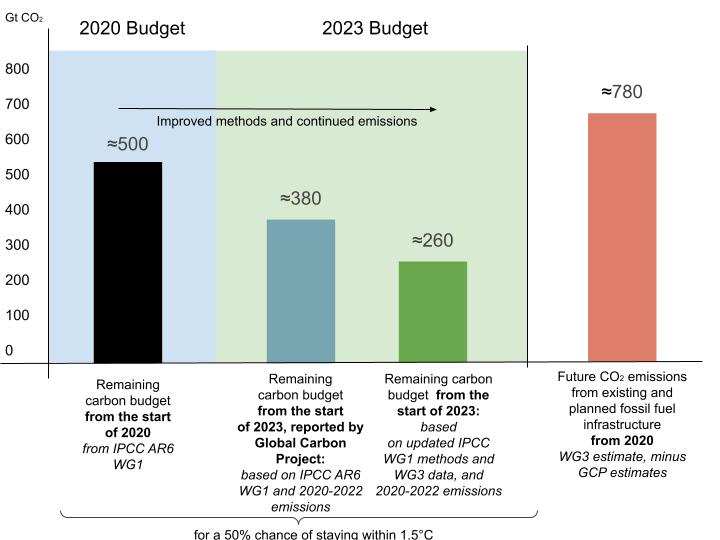Blowing Our Carbon Budget
If we think of the world’s ‘carbon budget’ in the same way we do our household finances, then right now we’d be slamming the breaks on spending.
Recent research shows that if we want to have a 50% chance of limiting global warming to 1.5°C - a level that will mitigate, but not avoid, an increase in the severity and frequency of extreme weather events - then we have less than 400Gt CO2 left to emit (Friedlingstein et al., 2022).
Our carbon budget is rapidly dwindling. Global CO2 emissions in 2021 and 2022 have rebounded to 40.2 and 40.5Gt CO2, shrinking the already-small budget we have for acceptable levels of carbon pollution by 121Gt CO2 since 2019. Incorporating the latest understanding of the future warming impact of other pollutants, such other greenhouse gases and aerosols, could reduce the remaining budget by another 120Gt CO2, leaving us just 260Gt CO2 to work with (Foster et al., 2022).
Accounting for all the variables, if we keep going at this rate we’re looking at being out of budget anywhere between six and a half to nine years time.
A logical response to blowing any kind of budget is to rein in the outgoings. In this case, it means there is no room for additional fossil fuel projects that have not been approved or are not under construction (IEA, 2022; Trout et al, 2022; IPCC, 2022). Global forecasts show additional supply is not needed (IEA, 2022).
Investors in high-emitting companies who are concerned about the long-term risks to their investments and the livability of the planet (both these outcomes are linked by the way - but that’s another blog post) should be asking these companies to:
- accelerate their transition towards the supply of non-fossil fuel energies
- stop investing in fossil fuel projects
- increase investment in renewable energy and transmission
- increase investment in green alternatives for heavy industry
There is also an urgent need for governments to discuss whether divestment of producing assets needs to be regulated. Fossil fuel asset divestment is like shifting the deckchairs on the Titanic - it does not lead to emission reductions.

Remaining carbon budget estimates for a 50% chance of staying within 1.5°C warming, based on different methodologies, compared to future emissions from planned and existing fossil fuel infrastructure from 2020. Source: CarbonBrief, Forster et al, 2022, credit: Uta Klönne, Debbie Rosen and Piers Forster (Constrain, 2022)
Dimitri Lafleur is ACCR's Chief Scientist. After leaving an 11 year career as a geoscientist in the oil and gas industry, Dimitri completed a PhD on climate change and energy transition.
Sign up for email updates about new ACCR research and engagement on specific topics of interest to you.
References: Friedlingstein et al., 2022; Forster et al., 2022, CarbonBrief blog, Trout et al., 2022; IEA, 2022; IPCC, 2022